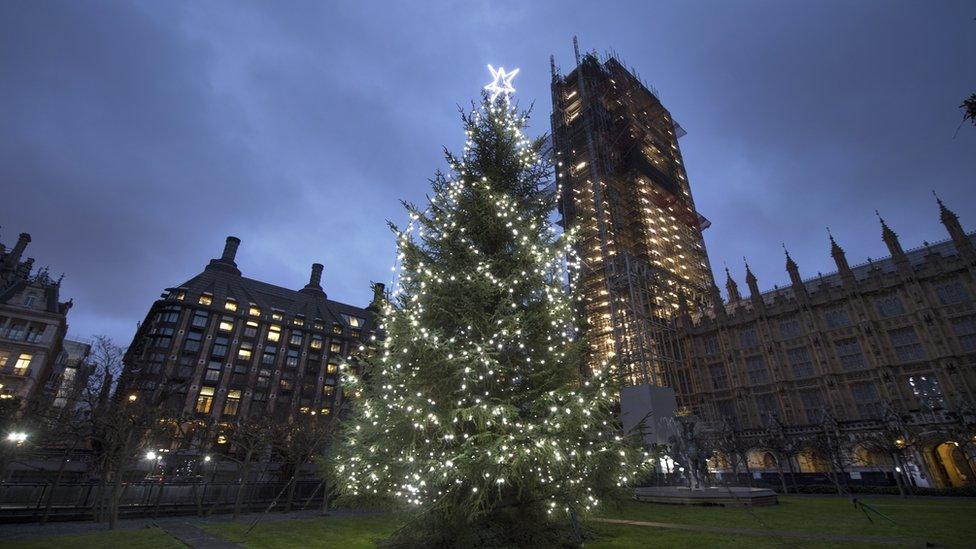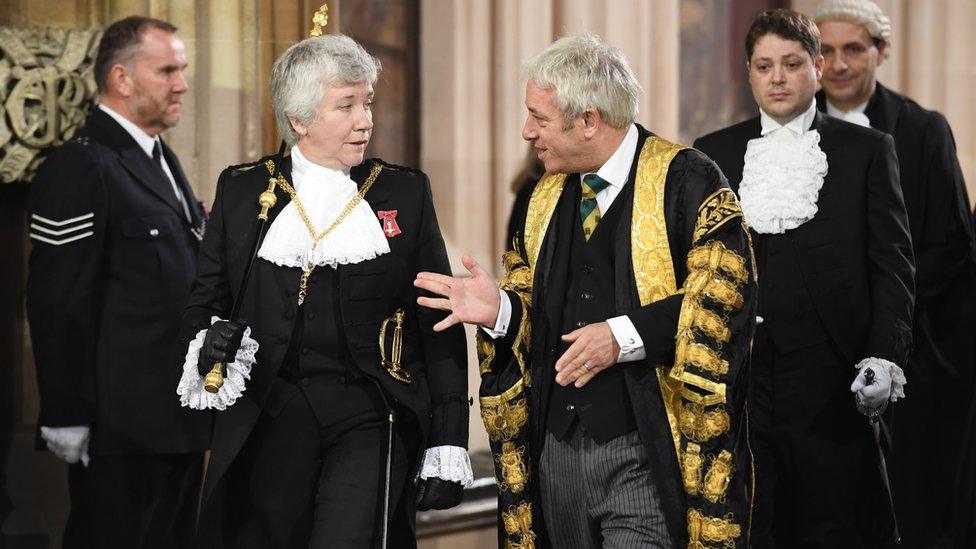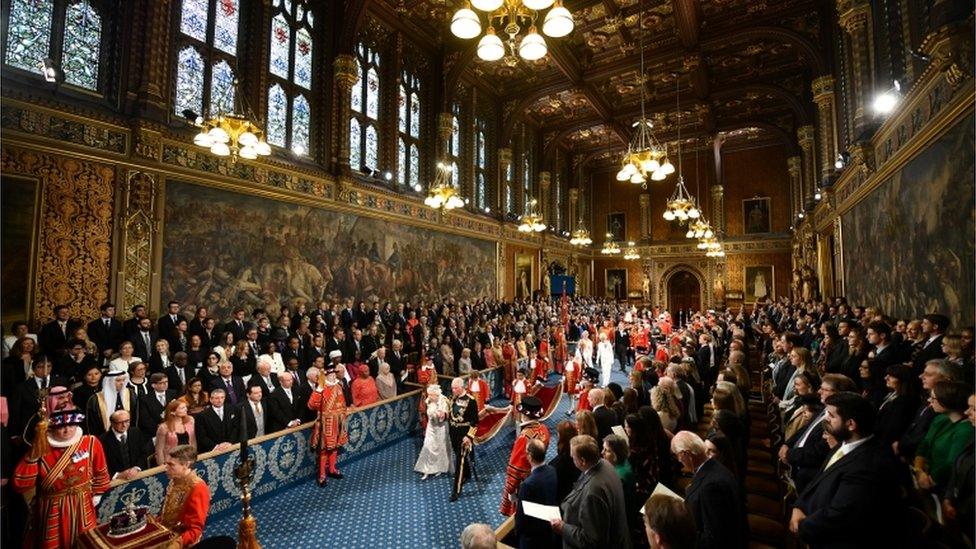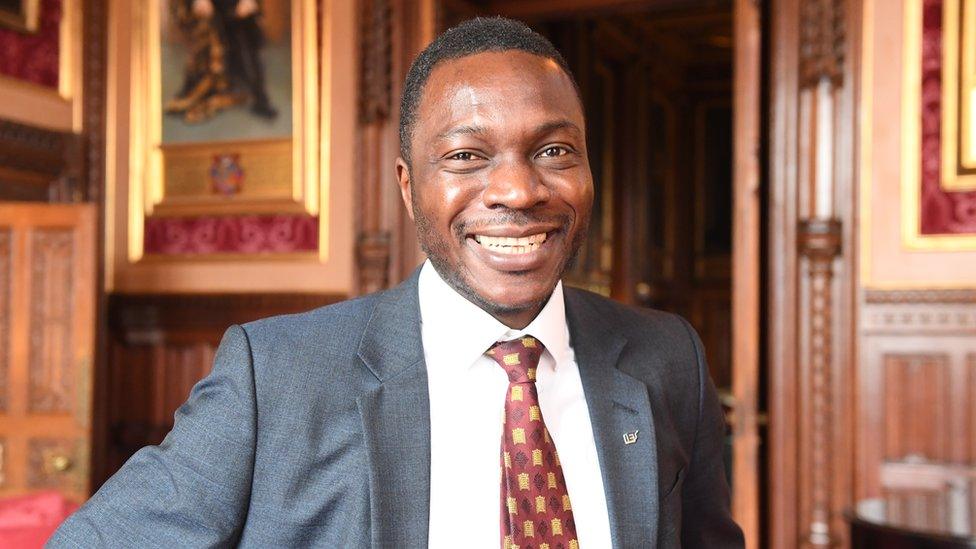General election 2019: What happens after the results?
- Published

Getting elected is only the beginning.
The victors will be exhausted, but they will need to hit the ground running in Westminster, with a Queen's Speech expected within days - if a majority government is elected - and possibly a debate on the key Brexit legislation, the Withdrawal Agreement Bill, before Christmas.
And all that will happen alongside the boring administrative grind of getting the Commons up and running, as well as their own political operations.
How will it unfold? Here's a possible timeline:
Overnight 12-13 December
The winning candidate gets given a personal "welcome letter" by the returning officer from the clerk of the Commons, setting out the arrangements for them to take up their role as an MP.
This covers things like the reception area that will be set up for new MPs, a "buddy" system giving each new member a named official who will be their first point of contact, and details about issues such as IT access and photo passes.
Commons officials will be working through the weekend to get the newcomers started, and the arrangements will include a room set aside for new members' children, complete with Lego.
Most MPs will have temporary office arrangements for quite a while, as the delicate process of allocating offices unfolds. The process is so politically sensitive that it is left entirely in the hands of the whips - the Commons administrators have never wanted to have anything to do with the actual decisions.

Parliamentary officials, including former speaker John Bercow, at the last state opening of Parliament in October
Top cabinet ministers are billeted in the Victorian Palace of Westminster, behind the Speaker's chair; lesser ministers get some rather unattractive basement digs, on the basis that they won't be using them much.
When the shadow cabinet is announced, its members will get offices a little further away. But for the rest, the Commons office buildings have a pecking order set in concrete, with senior ex-ministers and similar grandees enjoying corner offices with sweeping views of the Thames or Parliament Square and rapid access to the chamber. Lowly newcomers find themselves in converted broom cupboards in distant corners of the Parliamentary Estate.
In this most status-conscious of environments, working out who gets what and placating the egos involved can take quite a while.
Just about the only person outside government who can be sure of an office is the Leader of the Opposition, who traditionally gets an office suite in the Norman Shaw South building.
The SNP (in a clear demonstration that the whips who order these things have a mordent sense of humour) were mostly located in a distant building on Parliament Street, which requires Olympic-level sprinting abilities to reach the voting lobbies when the division bell sounds.
Tuesday 17 December
MPs gather for their first duty: to elect a Speaker.
Black Rod summons MPs to the Lords, where the commissioners (senior peers representing the Queen) direct MPs to return to their chamber and hold the election.
Then the Father of the House presides, while MPs debate the motion "that the Right Honourable Sir Lindsay Hoyle do take the Chair of this House as Speaker". The motion is divisible, which is to say it can be voted on, but there has never been a vote. This is the only issue on which MPs can speak or vote before taking the oath.
Having been re-elected, the Speaker then goes to the Queen to seek the confirmation of the Commons' "undoubted rights": freedom of speech, favourable construction (that is, the Queen must always take the actions of the House in good spirit) and direct access (the right to send an humble address).
This confirms the privileges of Parliament that are formalised in Article IX of the 1688 Bill of Rights, so it's a ritual with deep historical roots. Thus confirmed, the Speaker can begin swearing in MPs.
The names of the MPs duly elected are returned to the clerk of the Crown in Chancery (Sir Richard Heaton) to be entered into the white book, the authoritative list which identifies those entitled to take their seats in the Commons.
The white book is delivered to the Commons by Sir Richard in person - he will come to the Bar of the House, the entrance to the Commons chamber, and hand it to the clerk assistant, the second-most senior Commons clerk.
The process of administering the oath to around 650 MPs then begins.
Normally they start with the most senior members - the cabinet and shadow cabinet - after which the oath is administered by intake, so the longest-serving go first, and the new arrivals last.
This can be rushed a bit if they want to get it all done in a day, but the alternative is that the timing becomes less clear, and some families and friends may not be in the gallery at the moment when someone swears in.
Keep an eye out for jockeying for position among the new intake - the order of swearing in may determine who is Father or Mother of the House in a few decades' time.
And it's worth remembering that MPs who speak or vote without having taken the oath are automatically deprived of their seat "as if they were dead" under the Parliamentary Oaths Act of 1866. There's an additional penalty of £500, which really was a penalty in 1866.
MPs can, of course, affirm rather than swear an oath to God on any of the selection of holy books held for the purpose in the Chamber.
Thursday 19 December

The earliest the State Opening of Parliament could be is 19 December
This is the earliest possible day for a State Opening, when the new government will announce its programme of legislation for the coming year.
Inevitably the early months will be dominated by Brexit. And if the Conservatives get a majority - and depending on how rapidly the new government wants to move - that could mean the debate on a new Queen's speech continuing into Friday 20 December - perhaps with an interruption on the Friday, or even on Monday 23 December, for a second reading debate on the Withdrawal Agreement Bill.
The advantage of getting the second reading done before Christmas is that it would allow amendments for the committee stage to be drawn up over the Christmas and New Year break, which would hasten the moment when the Commons could sit as a "committee of the whole House" to consider the detail.
The House would also need to move rapidly to elect deputy speakers. There will probably be a short temporary fix to name a couple of acting deputies until the elected ones are in place, so the Speaker does not have to be in the chair for every minute of the sitting - this would probably be done on State Opening day.
Particularly important will be the senior deputy, the chairman of ways and means - the post just vacated by the new Speaker, Sir Lindsay Hoyle. The chairman of ways and means is in charge of selecting amendments for consideration in committee stage, when MPs look at the detail of a bill.
He or she will immediately face the crucial task of sifting through possibly hundreds of amendments that will be proposed for the Withdrawal Agreement Bill - and they can also expect to preside over a budget fairly early in the new year, thanks to the ancient rule that the Speaker does not chair budget debates.
One of the deputies will be Labour and one must be a woman. It has never yet happened, but it is possible that the gender rule could see a woman deputy being appointed ahead of a man who received more votes.
There will also be pressure to get select committee chairs elected and in place as rapidly as possible, to ensure that the government is properly scrutinised -but it may be a while before ministers are prepared to press the starting button.
The first step is to agree a carve-up between the parties to decide which party gets to provide chairs for which committees. The share-out will be broadly proportional to the make-up of the new Commons, but the key issue is the distribution of the plum committee posts.
Typically, a government party will wish to provide the chair of the Treasury Committee - arguably the single most important committee corridor job - but the distribution of home affairs, foreign affairs, defence, health, education and the rest will depend on the relative strength of the parties.
One complication is that a couple of senior figures (if re-elected on 12 December) may have reached the term limits which cap the number of parliaments in which someone can chair a committee. Sir Bill Cash (European scrutiny) Sir Bernard Jenkin (public administration and constitutional affairs) and David TC Davis (Welsh affairs) could fall foul of these rules- but there might be some negotiation, because the last two parliaments have been unusually short.
Of course all this depends on there being a clear winner of the election - failing that, we could well see the state opening postponed until January, while horses are traded and souls sold.
- Published18 July 2019
- Published16 October 2019

